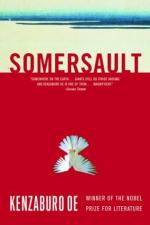|
This section contains 626 words (approx. 3 pages at 300 words per page) |

|
SOURCE: King, Francis. “The Doubtful Wisdom of Eeyore.” Spectator 289, no. 9077 (27 July 2002): 39.
In the following review, King faults Rouse Up, O Young Men of the New Age as a “narrow and self-referential” work.
The inspiration of Kenzaburo Oe, Japanese winner of the 1994 Nobel Prize for Literature, has repeatedly derived from an obsession. In turn that obsession has derived from a tragedy. In 1963, the first of his three children, Hikari, was born with brain damage so severe that it was doubtful if he would survive. Now 38, Hikari still survives, doubly incontinent, subject to epilepsy, unable to read and scarcely able to express himself, but miraculously gifted with the ability to compose short pieces of music.
In recent times we have seen increasingly numerous cases of victims attempting to find solace for devastating experiences—sexual abuse, near-fatal illness, the loss of a partner, a parent or a child—through the transfiguration...
|
This section contains 626 words (approx. 3 pages at 300 words per page) |

|


